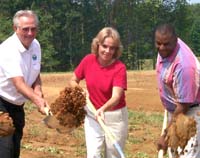Aquaculture Project Moving Forward in Western Kentucky
Aquaculture Project Moving Forward in Western Kentucky

By fall, members of the Purchase Area Aquaculture Cooperative hope to have their new catfish processing facility ready to begin filleting one million pounds of fish annually.
John Murdock, board chairman, said the cooperative started with a group of interested farmers and a meeting put together by the University of Kentucky College of Agriculture's Cooperative Extension Service.
As the group explored the possibility, they made visits to Mississippi and came to the conclusion it was a viable idea but needed a cooperative effort.
"We wanted to involve a number of farmers interested in the program and this would make it possible for us to put more resources together," he said.
The Kentucky Department of Agriculture's Value-Added Grants program helped provide the money necessary to get the project off the ground. The Jackson Purchase R, C & D Foundation helped the cooperative put together the grant proposals and received two grants, one for $196,000 and another for $151,000.
One of the grants is to help develop the processing plant and the other to aid in development of the fingerling and hatchery facilities.
The group bought a 70-acre site at Tri City in Graves County. Several ponds have already been dug for the fingerling and hatchery operation and work will soon begin on the processing plant.
And the group is already thinking of expanding.
" We think we have at least 25,000 acres in this area that could be utilized for catfish ponds, there are excellent water resources and lots of interest from farmers," Murdock said.
Some are interested because of cuts in their tobacco production. But it fits in well with grain production. There are some poorly drained soils in the area not very well suited for row crop production that could be used for catfish farming.
Also, it works well for small farmers with limited acres, Murdock said. Some farmers interested in the catfish operations are in poultry production.
Murdock said the facility should be up and running by October and employ about 15 people. But the real employment is out in the field, he said.
There are 25 farmers in the cooperative and probably another 200 farmers that are interested in joining, Murdock said. Primarily, the farmers are from the Purchase area in western Kentucky but the cooperative is open to anyone in Kentucky, Murdock said.
Bill Green, Graves County Extension agent for agriculture, along with other extension agents in the Purchase area and Kentucky State University's aquaculture program have provided good support and information, Murdock said.
Green said area farmers had the seeds of interest and Extension helped them cultivate it.
"They had a core and it's grown from there," he said.
If farmers have the right soil and water they may want to consider aquaculture, Green said.
"With aquaculture, we still get about 60 percent of our harvest from the wild and that wild harvest is dwindling because of a lot of reasons - pollution, over harvesting," he said. "There's going to be a lot of restrictions put on to allow these populations to come back."
We no longer depend on wild buffalo but beef and swine for meat products, and Green said he thinks we will depend more and more on commercial aquaculture for our fish production.
The taste of pond raised is superior to wild catfish, Green said, because of the control farmers have over the environment in which the fish is raised.
But the cooperative and Green advise farmers to take a conservative approach when venturing into aquaculture.
Don't bet your farm or retirement on it, they say. Ease into it, get a feel for it and see if it is for you and then go from there.
For more information on aquaculture contact the Extension service.
